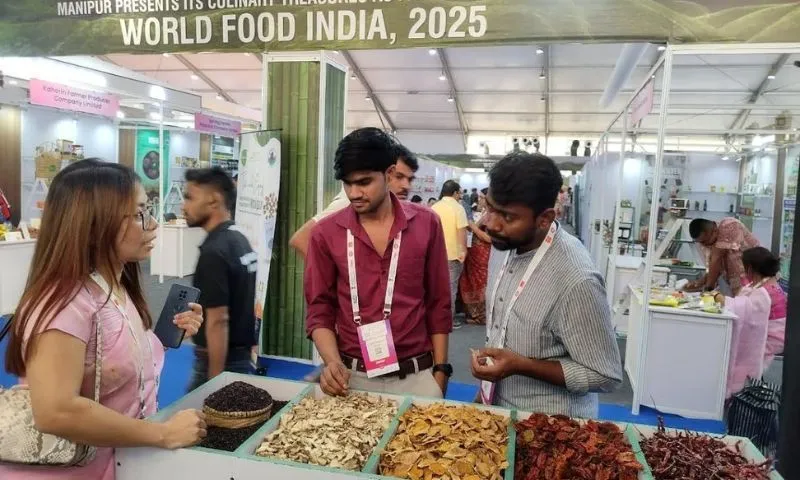Manipur’s Fiery ‘Yu’ and Black Rice ‘Chakhou’ Steal the Show at World Food India 2025
Manipur’s locally brewed fiery beverage Yu and its aromatic black rice Chakhou attracted strong international and national interest at World Food India (WFI) 2025, held at Bharat Mandapam from September 25–28. The state showcased 16 stalls representing the departments of Trade, Commerce & Industries; Horticulture; Agriculture; and Forests, and recorded significantly higher footfall than in previous years — with forest products and value-added traditional foods drawing many enquiries. The event also marked the first-time participation of Van Dhan Vikas Kendras (VDVKs) in Manipur’s exhibition lineup.
Manipur participated at WFI with 16 stalls that represented four government departments: Trade, Commerce & Industries (TCI); Horticulture; Agriculture; and Forests. For the first time, Van Dhan Vikas Kendras (VDVKs) — community-level forest produce collectives — joined the state exhibition, lifting the show’s grassroots authenticity. The state highlighted a suite of products: GI-tagged fruits and vegetables, smokeless smoked meat, chia seeds, ginger, Kachai lemon, black aromatic rice (Chakhou), bamboo shoots, cinnamon and more — along with an emphasis on modern food processing techniques to add value. The increased footfall at Manipur’s stalls and the floods of product enquiries confirmed the state’s strategy: tell a real story, and buyers will come.
FAQs
Q1: What is Yu and can it be exported?
A1: Yu is a traditional fermented beverage from Manipur with a strong, warming flavor profile. It can be exported, but it requires standardization for safety, consistent alcohol content control, proper lab testing, licensing, and compliance with the importing country’s alcohol regulations. Packaging and traceability also matter for market acceptance.
Q2: What makes Chakhou (black rice) special compared to regular rice?
A2: Chakhou is an aromatic black rice rich in antioxidants (anthocyanins), with higher fiber and micronutrient content than many white rice varieties. Its flavour profile, colour and nutritional benefits position it well in premium, health-focused markets, provided it is cultivated and processed to meet food-safety standards.
Q3: How do Van Dhan Vikas Kendras help local communities?
A3: VDVKs train and support tribal and forest-dwelling communities to process, package and market forest produce — keeping more value in the community, improving incomes, and encouraging sustainable harvesting practices. Their presence at WFI signalled grassroots inclusion in Manipur’s value-chain plans.
Q4: What immediate steps should Manipur producers take after WFI?
A4: Producers should prioritize lab testing for safety and nutritional claims, secure certifications where needed, pilot small export orders with reliable partners, upgrade packaging to international norms, and form processing cooperatives or link with VDVKs for scale and consistency.
Q5: Can food tourism help scale these products?
A5: Absolutely. Food tourism — homestays, culinary tours, farm visits — creates experiential demand and loyal customers. Visitors who experience products like Yu and Chakhou locally become brand advocates, and their stories drive word-of-mouth and repeat purchases. Pairing product promotion with curated travel experiences is a high-leverage growth strategy.


